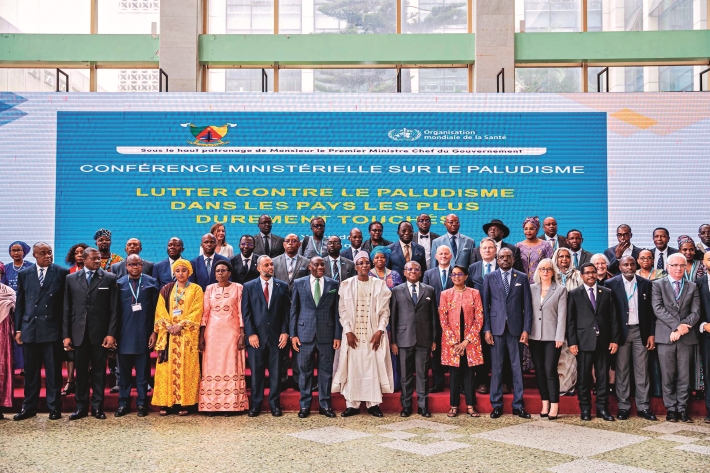|
||||||||||
| Home Nation World Business Opinion Lifestyle ChinAfrica Multimedia Columnists Documents Special Reports |
|
||||||||||
| Home Nation World Business Opinion Lifestyle ChinAfrica Multimedia Columnists Documents Special Reports |
| ChinAfrica |
| Towards A Malaria-Free Future |
| Eleven African countries join hands to put an end to the deaths caused by malaria by 2030 |
| By FRANÇOIS ESSOMBA | VOL. 16 May 2024 ·2024-05-20 |

Group photo of participants at a ministerial conference on malaria in Yaoundé, capital of Cameroon (COURTESY)
Malaria is a fatal disease transmitted by certain species of mosquitos, causing over 600,000 deaths annually, mainly in Africa, according to the World Health Organisation (WHO). At a ministerial conference held in Yaoundé, capital of Cameroon, representatives from 11 out of the 12 nations most severely impacted by the disease, including Ghana, Mali, Mozambique, and the Democratic Republic of the Congo, vowed to reduce malaria-related mortality by at least 90 percent compared to 2015 levels.
The initiative, led by Cameroon’s Prime Minister Joseph Dion Ngute, is called Fighting Malaria in the Most Affected Countries. The conference was preceded by a meeting of the advisory group on anti-malaria strategy. Participants discussed strategies for eradicating malaria in Africa. As the host, Ngute emphasised Cameroon’s unwavering commitment to eradicate the disease. He revealed that Cameroon recorded over 2 million cases and 1,756 deaths due to malaria in 2023, with a prevalence rate of 26.1 percent in 2022. These figures justify holding this major event in Cameroon.

Joseph Dion Ngute, prime minister of Cameroon, chairs the ministerial conference on malaria in Yaoundé, capital of Cameroon (COURTESY)
Health ambitions
The WHO states that Burkina Faso, Cameroon, the Democratic Republic of the Congo, Ghana, Mali, Mozambique, Niger, Nigeria, Sudan, Tanzania and Uganda are the African countries most affected by malaria. In 2022, these countries recorded approximately 166 million cases of malaria and 423,000 deaths. However, efforts to combat the disease are hindered by fragile health systems, lack of resources and inadequate infrastructure. Climatic conditions make these countries more susceptible to malaria transmission.
The Global Technical Strategy for Malaria Control 2016-2030, developed by the WHO, aims to reduce the incidence of malaria and move towards its elimination within the framework of the Sustainable Development Goals. Specifically, it aligns with goal 3.3, which aims to eradicate malaria and other communicable diseases by 2030. The specific targets for malaria reduction include decreasing the incidence of the disease by at least 90 percent from 2015 levels, eliminating it in at least 35 previously endemic countries, and preventing its re-emergence in countries that have been declared malaria-free.
Cameroon is among the countries that have demonstrated political commitment and taken concrete actions to reduce the burden of malaria. For instance, Cameroon became a member of the Global Initiative to Roll Back Malaria in 1998. Additionally, it signed the Abuja Declaration in 2000, which urges African Union member states to allocate at least 15 percent of their national budgets to health care. Furthermore, Agenda 2063 also aims to achieve universal health coverage. Matshidiso Moeti, WHO’s regional director for Africa, emphasised the significance of reinforcing these initiatives: “With renewed momentum and increased determination, we can accelerate progress towards a malaria-free future.”
China’s support
After 70 years of sustained effort, China has been officially recognised by the WHO as a malaria-free country. This marks a remarkable advance since the 1940s when the country reported 30 million annual cases. Congratulating the people of China on achieving the feat, WHO Director-General Tedros Adhanom Ghebreyesus said, “This achievement is the result of a relentless struggle and is part of a focused and sustained effort over several decades.”
China is among the countries which have demonstrated that a malaria-free future is achievable globally. China plans to aid Africa in its fight against this disease, which remains a significant public health concern on the continent.
China’s aid includes treatment and preventive strategies. The treatment is based on the use of Artemisinin, or Qinghaosu, a medicinal plant that has been used in traditional Chinese medicine for over 2000 years. Holley-Cotec Group, which has been operating for 35 years, has developed a vast pharmaceutical industry, including plantations, factories and extensive commercial networks throughout China. This has enabled it to supply the market with anti-malarial drugs such as Artemedine and Cotecxin for over 10 years. These products are marketed in over 30 countries, including 20 in Africa, and are recognised for their rapid efficacy and safety, according to reliable sources.
African people have expressed a desire for wider distribution of Chinese anti-malarial drugs, which have been consistently proven effective, particularly in rural areas, and for a reduction in costs to make them accessible to the most vulnerable. Holley-Cotec’s management is working on addressing these requests.
The WHO has said $7.8 billion is needed to effectively combat malaria in Africa. As of 2022, only $4.1 billion had been raised. Between 2000 and 2015, there was a significant 50 percent reduction in malaria mortality. However, there has been a resurgence of cases since 2015 due to insufficient funding, jeopardising the goal of reducing the mortality rate by 75 percent by 2025 in Africa.
To attract more funding for the fight against this disease, Cameroon’s Minister of Public Health Manaouda Malachie advocated meticulous planning of interventions, clear definition of areas of action, and dissemination of results and their economic impact. Similarly, the health ministers of Sudan, Burkina Faso, the Democratic Republic of the Congo, and Mali emphasised the need to raise awareness among decision-makers about prioritising the fight against malaria. They also highlighted the importance of promoting research to efficiently allocate resources and interventions that are tailored to local epidemiology. They called for more investment in health promotion and prevention than in combating the disease itself.
| About Us | Contact Us | Advertise with Us | Subscribe |
| Copyright Beijing Review All rights reserved 京ICP备08005356号-5 京公网安备110102005860号 |